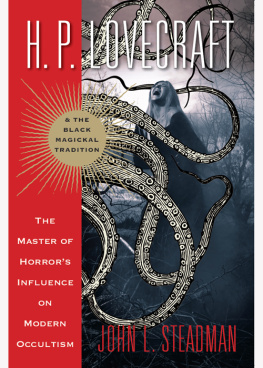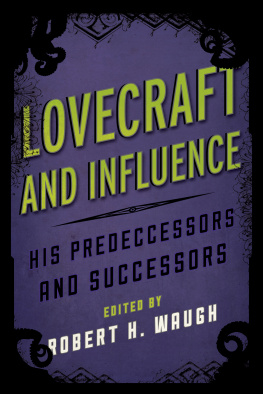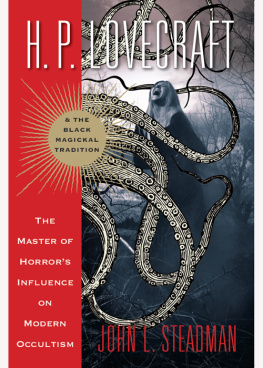Howard Lovecraft - Through the Gates of the Silver Key
Here you can read online Howard Lovecraft - Through the Gates of the Silver Key full text of the book (entire story) in english for free. Download pdf and epub, get meaning, cover and reviews about this ebook. genre: Science fiction. Description of the work, (preface) as well as reviews are available. Best literature library LitArk.com created for fans of good reading and offers a wide selection of genres:
Romance novel
Science fiction
Adventure
Detective
Science
History
Home and family
Prose
Art
Politics
Computer
Non-fiction
Religion
Business
Children
Humor
Choose a favorite category and find really read worthwhile books. Enjoy immersion in the world of imagination, feel the emotions of the characters or learn something new for yourself, make an fascinating discovery.

- Book:Through the Gates of the Silver Key
- Author:
- Genre:
- Rating:5 / 5
- Favourites:Add to favourites
- Your mark:
- 100
- 1
- 2
- 3
- 4
- 5
Through the Gates of the Silver Key: summary, description and annotation
We offer to read an annotation, description, summary or preface (depends on what the author of the book "Through the Gates of the Silver Key" wrote himself). If you haven't found the necessary information about the book — write in the comments, we will try to find it.
Through the Gates of the Silver Key — read online for free the complete book (whole text) full work
Below is the text of the book, divided by pages. System saving the place of the last page read, allows you to conveniently read the book "Through the Gates of the Silver Key" online for free, without having to search again every time where you left off. Put a bookmark, and you can go to the page where you finished reading at any time.
Font size:
Interval:
Bookmark:
Through the Gates of the Silver Key
by Howard Phillips Lovecraft
Chapter One
In a vast room hung with strangely figured arras and carpeted with Bonkhata rugs of impressive age and workmanship, four men were sitting around a document-strewn table. From the far corners, where odd tripods of wrought iron were now and then replenished by an incredibly aged Negro in somber livery, came the hypnotic fumes of olibanum; while in a deep niche on one side there ticked a curious, coffin-shaped clock whose dial bore baffling hieroglyphs and whose four hands did not move in consonance with any time system known on this planet. It was a singular and disturbing room, but well fitted to the business then at hand. For there, in the New Orleans home of this continent's greatest mystic, mathematician and orientalist, there was being settled at last the estate of a scarcely less great mystic, scholar, author and dreamer who had vanished from the face of the earth four years before.
Randolph Carter, who had all his life sought to escape from the tedium and limitations of waking reality in the beckoning vistas of dreams and fabled avenues of other dimensions, disappeared from the sight of man on the seventh of October, 1928, at the age of fifty-four. His career had been a strange and lonely one, and there were those who inferred from his curious novels many episodes more bizarre than any in his recorded history. His association with Harley Warren, the South Carolina mystic whose studies in the primal Naacal language of the Himalayan priests had led to such outrageous conclusions, had been close. Indeed, it was he who one mist-mad, terrible night in an ancient graveyard had seen Warren descend into a dank and nitrous vault, never to emerge. Carter lived in Boston , but it was from the wild, haunted hills behind hoary and witch-accursed Arkham that all his forebears had come. And it was amid these ancient, cryptically brooding hills that he had ultimately vanished.
His old servant, Parks who died early in 1930 had spoken of the strangely aromatic and hideously carven box he had found in the attic, and of the indecipherable parchments and queerly figured silver key which that box had contained: matters of which Carter had also written to others. Carter, he said, had told him that this key had come down from his ancestors, and that it would help him to unlock the gates to his lost boyhood, and to strange dimensions and fantastic realms which he had hitherto visited only in vague, brief, and elusive dreams. Then one day Carter took the box and its contents and rode away in his car, never to return.
Later on, people found the car at the side of an old, grass-grown road in the hills behind crumbling Arkham the hills where Carter's forebears had once dwelt, and where the ruined cellar of the great Carter homestead still gaped to the sky. It was in a grove of tall elms near by that another of the Carters had mysteriously vanished in 1781, and not far away was the half-rotted cottage where Goody Fowler, the witch, had brewed her ominous potions still earlier. The region had been settled in 1692 by fugitives from the witchcraft trials in Salem , and even now it bore a name for vaguely ominous things scarcely to be envisaged. Edmund Carter had fled from the shadow of Gallows Hill just in time, and the tales of his sorceries were many. Now, it seemed, his lone descendant had gone somewhere to join him!
In the car they found the hideously carved box of fragrant wood, and the parchment which no man could read. The silver key was gone presumably with Carter. Further than that there was no certain clue. Detectives from Boston said that the fallen timbers of the old Carter place seemed oddly disturbed, and somebody found a handkerchief on the rock-ridged, sinisterly wooded slope behind the ruins near the dreaded cave called the Snake Den.
It was then that the country legends about the Snake Den gained a new vitality. Farmers whispered of the blasphemous uses to which old Edmund Carter the wizard had put that horrible grotto, and added later tales about the fondness which Randolph Carter himself hid had for it when a boy. In Carter's boyhood the venerable gambrel-roofed homestead was still standing and tenanted by his great-uncle Christopher. He had visited there often, and had talked singularly about the Snake Den. People remembered what he had said about a deep fissure and an unknown inner cave beyond, and speculated on the change he had shown after spending one whole memorable day in the cavern when he was nine. That was in October, too and ever after that he had seemed to have a uncanny knack at prophesying future events.
It had rained late in the night that Carter vanished, and no one was quite able to trace his footprints from the car. Inside the Snake Den all was amorphous liquid mud, owing to the copious seepage. Only the ignorant rustics whispered about the prints they thought they spied where the great elms overhang the road, and on the sinister hillside near the Snake Den, where the handkerchief was found. Who could pay attention to whispers that spoke of stubby little tracks like those which Randolph Carter's square-toed boots made when he was a small boy? It was as crazy a notion as that other whisper that the tracks of old Benijah Corey's peculiar heelless boots had met the stubby little tracks in the road. Old Benijah had been the Carters' hired man when Randolph was young; but he had died thirty years ago.
It must have been these whispers plus Carter's own statement to Parks and others that the queerly arabesqued silver key would help him unlock the gates of his lost boyhood which caused a number of mystical students to declare that the missing man had actually doubled back on the trail of time and returned through forty-five years to that other October day in 1883 when he had stayed in the Snake Den as a small boy. When he came out that night, they argued, he had somehow made the whole trip to 1928 and back; for did he not thereafter know of things which were to happen later? And yet he had never spoken of anything to happen after 1928.
One student an elderly eccentric of Providence, Rhode Island , who had enjoyed a long and close correspondence with Carter had a still more elaborate theory, and believed that Carter had not only returned to boyhood, but achieved a further liberation, roving at will through the prismatic vistas of boyhood dream. After a strange vision this man published a tale of Carter's vanishing in which he hinted that the lost one now reigned as king on the opal throne of Ilek-Vad, that fabulous town of turrets atop the hollow cliffs of glass overlooking the twilight sea wherein the bearded and finny Gniorri build their singular labyrinths.
It was this old man, Ward Phillips, who pleaded most loudly against the apportionment of Carter's estate to his heirs all distant cousins on the ground that he was still alive in another time-dimension and might well return some day. Against him was arrayed the legal talent of one of the cousins, Ernest K. Aspinwall of Chicago, a man ten years Carter's senior, but keen as a youth in forensic battles. For four years the contest had raged, but now the time for apportionment had come, and this vast, strange room in New Orleans was to be the scene of the arrangement.
It was the home of Carter's literary and financial executor the distinguished Creole student of mysteries and Eastern antiquities, Etienne-Laurent de Marigny. Carter had met de Marigny during the war, when they both served in the French Foreign Legion, and had at once cleaved to him because of their similar tastes and outlook. When, on a memorable joint furlough, the learned young Creole had taken the wistful Boston dreamer to Bayonne , in the south of France , and had shown him certain terrible secrets in the nighted and immemorial crypts that burrow beneath that brooding, eon-weighted city, the friendship was forever sealed. Carter's will had named de Marigny as executor, and now that avid scholar was reluctantly presiding over the settlement of the estate. It was sad work for him, for like the old Rhode Islander he did not believe that Carter was dead. But what weight had the dreams of mystics against the harsh wisdom of the world?
Font size:
Interval:
Bookmark:
Similar books «Through the Gates of the Silver Key»
Look at similar books to Through the Gates of the Silver Key. We have selected literature similar in name and meaning in the hope of providing readers with more options to find new, interesting, not yet read works.
Discussion, reviews of the book Through the Gates of the Silver Key and just readers' own opinions. Leave your comments, write what you think about the work, its meaning or the main characters. Specify what exactly you liked and what you didn't like, and why you think so.




